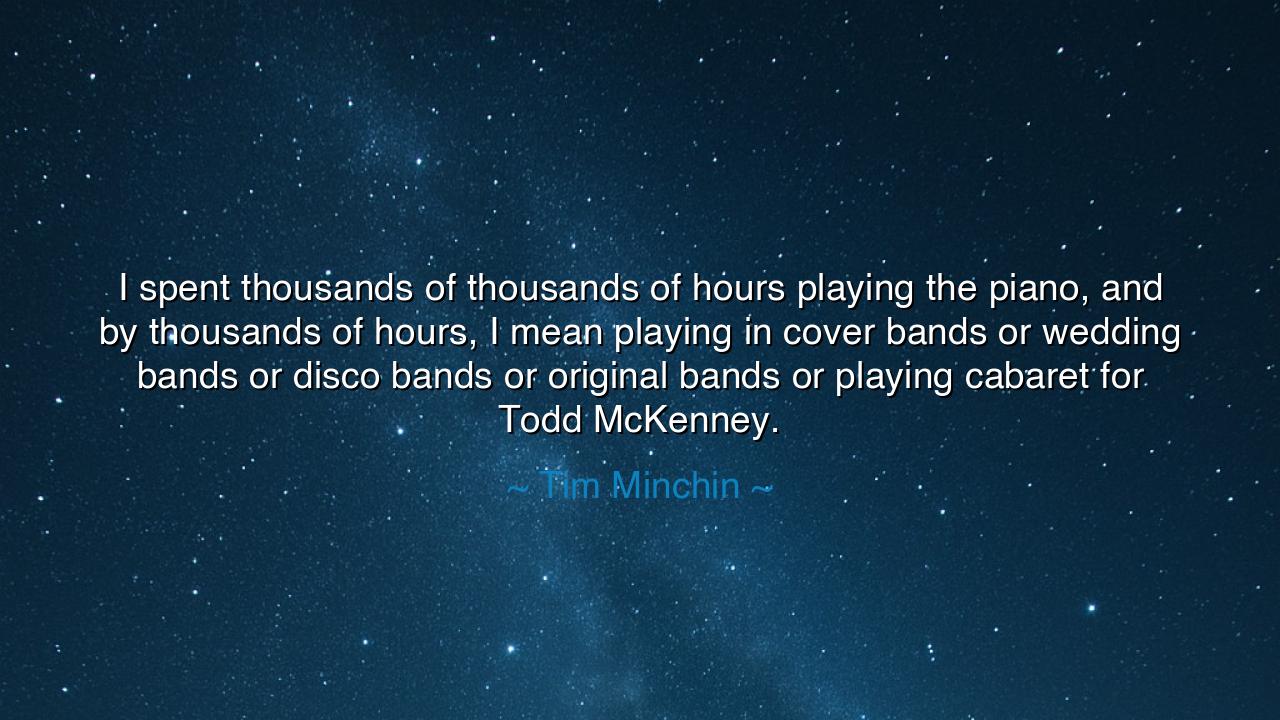
I spent thousands of thousands of hours playing the piano, and
I spent thousands of thousands of hours playing the piano, and by thousands of hours, I mean playing in cover bands or wedding bands or disco bands or original bands or playing cabaret for Todd McKenney.






In the words of Tim Minchin, we hear the song of perseverance, the hymn of hours upon hours spent in humble labor. He speaks of thousands of hours at the piano, not in gilded halls of glory, but in the trenches of cover bands, wedding bands, disco bands, original bands, and even in the cabaret of Todd McKenney. His tale reminds us that greatness is rarely born from sudden lightning, but from the steady flame of relentless devotion.
The ancients understood this truth well. Herodotus tells of the warriors of Marathon who trained endlessly, long before their single day of glory. Victory did not come from the brilliance of a moment, but from the unseen sweat of preparation. So too does Minchin reveal that mastery of art is carved not in bursts of brilliance, but in repetition, resilience, and endurance across countless stages, no matter how small.
In his words lies also the lesson of humility. For the wedding band and the disco band may not carry the prestige of concert halls, yet each hour in them is sacred, shaping the hand, the ear, and the heart. To play before guests who feast, or dancers who whirl, is to learn how music touches not just the lofty, but the ordinary lives of people. Thus, the artist becomes not only a master of technique, but a servant of humanity, learning to stir joy in every corner.
History mirrors this path in the journey of Beethoven, who began as a child performer in taverns and noble courts, playing wherever there was need. Those early hours, though humble, forged the fire that would later birth symphonies eternal. So too Minchin, before his fame, built his craft in places unseen, proving that there are no wasted hours in the pursuit of mastery. Every note, every gig, every modest performance is a stone in the foundation of greatness.
Therefore, let this teaching endure: there is no shortcut to mastery, no crown without toil. The hours spent in obscurity are not loss, but preparation. To play for strangers at a wedding, or to fill the night with cabaret, is to honor the gift entrusted to one’s hands. Minchin’s words remind us that what seems ordinary to the world may be sacred to the artist. And when the day of recognition finally arrives, it is the echo of all those unseen hours that resound in triumph.






THTrang Huyen
I love how Tim Minchin describes the variety of musical experiences he’s had over the years. It’s a reminder that musicians often start by playing for different types of crowds before developing their own voice. Playing for Todd McKenney or in cabaret must have given him some interesting insights into performance. Do you think that kind of diverse experience is essential for building a successful career in music, or can a musician stick to one niche and still thrive?
TXThanh Xuan
Tim Minchin’s mention of playing in wedding bands and cover bands is such a relatable experience for many musicians. It’s not just about honing a skill but also about adapting to different audiences. I can imagine how playing in all these different settings taught him to be versatile and prepared for anything. I wonder—does the repetition of playing familiar songs ever get boring, or does it still feel fresh with each performance?
TTTram Lam Thi Thanh
This quote from Tim Minchin really highlights the work ethic and diverse experiences musicians often go through. Playing in so many different types of bands must have shaped his musicality in unexpected ways. What I wonder is, how did all those hours of playing for various genres help him develop his unique style as a performer and songwriter? Sometimes, doing all those different things can lead to a very personal and eclectic form of expression.
DHLe Dinh Huy
Tim Minchin’s reflection on how he spent thousands of hours playing the piano in various settings is fascinating. It shows how diverse and varied a musician’s journey can be. I’m curious, though—how did all those different music genres influence his approach to music and performance? Did he find playing in cover or wedding bands different from performing his own material? It’s interesting to think about how versatile musicians have to be, depending on the audience.